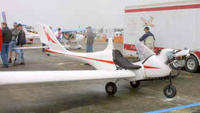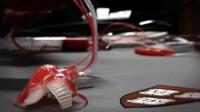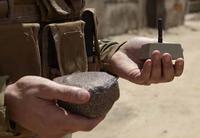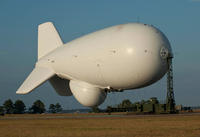-
Unmanned civilian drones vulnerable to hijacking
Unmanned drones have become the eyes and ears of the military in recent years, giving them an advantage in intelligence gathering and in operations without risking soldiers’ lives; the drones’ versatility and low price have made them an attractive tool for domestic law enforcement and first response missions; there is one glitch, though: drones can be hijacked; if that happens, these swift, unmanned aircrafts could become weapons for terrorists
-
-
DHS seeks better ways to detect ultra light aircrafts used by smugglers

As the war on drugs continues with every sunrise and sunset, DHS has awarded a contract just short of $100 million for a specialized system which will be able to detect ultralight aircrafts which are used to smuggle drugs across the border
-
-
Lifelike, cost-effective robotic hand disables IEDs
Researchers at Sandia National Laboratories have developed a cost-effective robotic hand that can be used in disarming improvised explosive devices, or IEDs; the Sandia Hand addresses challenges which have prevented widespread adoption of other robotic hands, such as cost, durability, dexterity, and modularity
-
-
Unmanned sub-tracker to address a silent threat
The growing number of adversaries able to build and operate quiet diesel electric submarines is a national security threat that affects U.S. and friendly naval operations around the world; DARPA autonomous surface vessel will track and follow enemy subs for months
-
-
Soft robots for search-and-rescue and reconnaissance missions

Soft robots are useful because they are resilient and can maneuver through very constrained spaces, which makes them useful for search-and-rescue and reconnaissance missions; researchers show a soft robot made of silicone; it can walk, change color, and light up in the dark; it can even change temperature; it can do all of this for less than $100
-
-
U.S. Army trains rats in explosives detection

Landmines kill between 15,000 and 20,000 people a year, and continue to kill adults and children decades after a conflict ends; the U.S. Department of Defense currently relies on dogs as the animal of choice for explosives detection, but Pentagon researchers want to see whether rats can be trained to do the job; rats are smaller so they can search smaller spaces than a dog can, and are easier to transport
-
-
Underground spies to secure Indo-Pakistan border

With the discovery of a 400-foot long tunnel at the India-Pakistan Border, the IndianHome Ministry has decided to acquire Unattended Ground Sensors (UGS) that could be installed along the international border with Pakistan as an important line of defense
-
-
World’s largest blimp passes flight test

The world’s largest, lighter-than-air, optionally piloted aircraft — the U.S. Army’s Long Endurance Multi-Intelligence Vehicle (LEMV) – completed its first test flight in Lakehurst, New Jersey, the birthplace of the U.S. storied military airship past; the LEMV will provide improved ISR capabilities to the U.S. Army in the form of an “unblinking stare” over ground troops, ranging anywhere from one day to multiple weeks
-
-
First class of U.S. Army soldiers completed training with Raytheon's JLENS

JLENS uses a powerful integrated radar system to detect, track, and target a variety of threats, allowing military units to defend against threats, including hostile cruise missiles, low-flying manned and unmanned aircraft, large caliber rockets, and moving surface vehicles such as boats, SCUD-launchers, automobiles, and tanks
-
-
College buys small UAV for first-responder training program
Sinclair Community College in Dayton, Ohio purchases small unmanned aerial system (SUAS) from UTC Aerospace Systems for use in the college’s training program for first responders
-
-
First ever outdoor flight test of laser powered UAS
Lockheed Martin, LaserMotive, Inc. have completed a series of flight tests of the Stalker Unmanned Aerial System (UAS) to validate the performance of an innovative laser power system
-
-
NYPD, Microsoft develop and deploy new surveillance system
The New York Police Department (NYPD) and Microsoft have teamed up to create the Domain Awareness System, which will analyze real-time safety data for use by NYPD investigators; the system will act as a communications hub which will allow a number of advanced counterterrorism systems to relay information to more than 1,000 people in the field
-
-
Silent Falcon solar electric unmanned aerial system unveiled
Silent Falcon UAS Technologies last week unveiled the much anticipated Silent Falcon solar electric unmanned aerial system (UAS) at the Association for Unmanned Vehicle Systems International (AUVSI) conference in Las Vegas
-
-
Advanced explosives detector sniffs out previously undetectable amounts of TNT

TNT and other conventional explosives are the mainstays of terrorist bombs and the anti-personnel mines that kill or injure more than 15,000 people annually in war-torn countries; in large, open-air environments, such as airports, train stations, and minefields, concentrations of these explosives can be as small as a few parts of TNT per trillion parts of air, making it impossible for conventional bomb and mine detectors to detect the explosives and save lives
-
-
Manned planes beating drones as the more capable tool in war on drugs

In the never-ending war on drugs, U.S. Navy planes are showing that technology does not necessarily mean improvement, as manned planes are outmaneuvering unmanned drones in catching cocaine smugglers traveling by sea; in 2011 the manned planes caught an average of $30 million of cocaine per day, and during the last five years they have detected more than 853,000 pounds of cocaine
-
More headlines
The long view
Why Was Pacific Northwest Home to So Many Serial Killers?
Ted Bundy, Gary Ridgway, George Russell, Israel Keyes, and Robert Lee Yates were serial killers who grew up in the Pacific Northwest in the shadow of smelters which spewed plumes of lead, arsenic, and cadmium into the air. As a young man, Charles Manson spent ten years at a nearby prison, where lead has seeped into the soil. The idea of a correlation between early exposure to lead and higher crime rates is not new. Fraser doesn’t explicitly support the lead-crime hypothesis, but in a nimble, haunting narrative, she argues that the connections between an unfettered pollution and violent crime warrant scrutiny.
Bookshelf: Smartphones Shape War in Hyperconnected World
The smartphone is helping to shape the conduct and representation of contemporary war. A new book argues that as an operative device, the smartphone is now “being used as a central weapon of war.”
